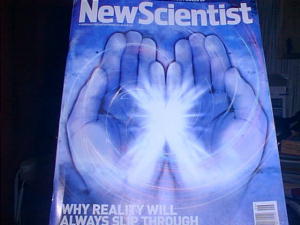Sunday 3 March 2002

|
Pic of the day: New Scientist 9. February 2002. "Why reality will always slip through your fingers." Where knowledge endsAccording to this massively interesting article in New Scientist, we may never find the basic building blocks of the universe. Or rather, there may be no basic building blocks of the universe. Matter and energy may be emergent phenomena that emerge from something fundamentally different. Much like a wave on water is fundamentally different from the water, and the vibration of a string is fundamentally different from the string itself. I'm not sure quite how new this is. I'm just a layman in these matters, but for a long time now we have thought about vaccuum as something more than absence of matter - as a medium through which waves spread effortlessly, for instance, and permeated by various fields that cannot be measured directly, only in their effects. Presumably mass is also caused by some undetectable field that is omnipresent in our universe. (The corresponding particle is named "Higgs boson" but I don't think people really expect to isolate it anytime soon.) There is also the claim, I don't think this has been measured yet but it is generally accepted, that pairs of particles and anti-particles show up out of nothing all the time, then go back to nothing, because their average energy is zero or below. Quantum fluctuations make them have positive energy occasionally, and so they come to exist; but normally they fluctuate back to nothingness before you can notice them. Near black holes one of the particles in the pair may be trapped in the gravity well while the other remains outside, and the one outside cannot return to oblivion alone so it runs off as Hawking radiation. It would be very nice if this was true, but perhaps we should wait with making black holes until we have some more data on it. ***Anyway, I guess you can imagine the glee of all spiritualist people around the world over the latest news. So it isn't, after all, matter all the way down! Well, actually we can't prove either way yet, but the article makes a good case for the possibility that the universe is a collection of wave effects in a medium utterly foreign to us. On my own, let me throw in the problem of "dark matter". Gravity is not behaving quite the way it was expected to; it acts as if there is a lot more matter in the universe than we can otherwise observe. There have been no shortage of explanations, from brown dwarf stars (millions and millions of them) to microscopic black holes, from neutrinos with mass to Weakly Interacting Massive Particles. But if our world is just waves on the surface of something we don't know, there could be other waves that don't otherwise interact with ours, except through gravity. There could be entire worlds obeying strikingly different laws of nature, for all we know. And we might pass right through them without ever knowing. Now that would be cool! ***Emergent behavior is quite the buzzword these days. I wonder, if we manage to not destroy our world prematurely, if someone will be reading this 50 years from now and grin at our ignorance. Today some of the things we see are like magic: We see that they happen but we don't know quite why. Emergent behavior in particular. Above all, how can consciousness and free will (well, reasonably free) arise from billions and billions of cells that have no consciousness, no free will, no purpose at all except to stay alive? The cells are made up of atoms that obey the laws of physics strictly. They do not deviate in any way from the simple laws of nature, but associate and dissociate according to the properties of their electrons. Yet, when there are billions of cells made of billions of atoms, somehow this deterministic system acquires free will and free thought. Creepy, huh? Similarly, a society of ants or bees often behaves as if it had far more intelligence than its individual members. They seem to throw away their lives stupidly, but the society - or superorganism, as some call it - behaves more rationally and prospers. With humans, it seems more often than not to be the other way around - a society accumulates the stupidity of its members. Yet in fact, few of us could survive more than a few days without our society. Emergent behavior: The whole is more than the sum of its parts. Or at least strikingly different. Is the entire universe, as one theologian put it, God's facial expression? Or are we and all our worlds just foam on a bottomless, trackless ocean consisting of something so utterly alien that sheer nothingness seems familiar in comparison? I have my own opinion on this, of course, as a christian and a part-time mystic. But anyway, it certainly adds a perspective to our restless hunt for more money and social recognition. |
Some snow, much sun. |
Yesterday <-- This month --> Tomorrow?